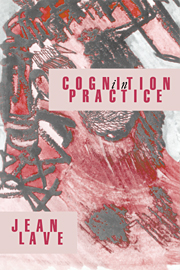Book contents
- Frontmatter
- Contents
- List of figures
- List of tables
- Preface
- 1 Introduction: psychology and anthropology I
- PART I THEORY IN PRACTICE
- PART II PRACTICE IN THEORY
- 5 Inside the supermarket (outdoors) and from the veranda
- 6 Out of trees of knowledge into fields for activity
- 7 Through the supermarket
- 8 Outdoors: a social anthropology of cognition in practice
- Notes
- References
6 - Out of trees of knowledge into fields for activity
Published online by Cambridge University Press: 02 December 2009
- Frontmatter
- Contents
- List of figures
- List of tables
- Preface
- 1 Introduction: psychology and anthropology I
- PART I THEORY IN PRACTICE
- PART II PRACTICE IN THEORY
- 5 Inside the supermarket (outdoors) and from the veranda
- 6 Out of trees of knowledge into fields for activity
- 7 Through the supermarket
- 8 Outdoors: a social anthropology of cognition in practice
- Notes
- References
Summary
The previous chapter explored the articulation of activities (math and grocery shopping) whose interrelations shaped their structure differently in two experimental situations. But activity is not the only source of structuring resources. People's social relationships give structure to their activities. People experience “problems” subjectively in the form of dilemmas and, so motivated, “problem-solving” activity often leads to more or less enduring resolutions rather than precise solutions. “Math” and standard crystallized forms of quantity such as those to be considered here – the system of currency and systems of measurement as well as algorithmic arithmetic – carry meaning and values as such, and these too are subjectively experienced. All of these sources of structuring resources for activity, being more than the quantitative relations to which they give shape, help to account for the characteristic fate of formal knowledge structures in practice: they are transformed from standardized forms into situationally specific realizations in practice, and when they are addressed as formal systems, more often than not it is to incorporate (only) their symbolic significance into ongoing activity.
We will begin to consider the meaning of “real” math, and with it the meaning of money and measurement, in contemporary American parlance in the following discussion. Next, distinctions made here between dilemmas and problems, and problem resolutions and solutions, need explanation. Two sources of data provide evidence for this analysis: measurement practices of the Weight Watchers and money management interviews with the shoppers.
Information
- Type
- Chapter
- Information
- Cognition in PracticeMind, Mathematics and Culture in Everyday Life, pp. 124 - 144Publisher: Cambridge University PressPrint publication year: 1988
